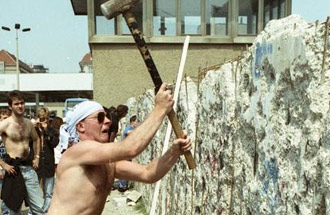
|  |  |  Editorials | Opinions | November 2009 Editorials | Opinions | November 2009  
What The Fall Of The Wall Meant For A Generation Of Men
 Steven Shaw - AskMen.com Steven Shaw - AskMen.com
go to original
November 08, 2009


| | For many, the fall of the Berlin Wall ranks alongside these other moments as one of those “where were you when…” events. |  |
Each generation has an epoch-defining moment. For some, it may have been the moon landings, for others, the attacks on the World Trade Center. For many, the fall of the Berlin Wall ranks alongside these other moments as one of those “where were you when…” events. Seeing ordinary men in the frenzy of excitement of tearing down the wall with tools brought from home was a vital and empowering sight.

However, it wasn't just about the literal tearing down of a concrete eyesore - the fall of the wall had major political, social and symbolic ramifications. As the 20th anniversary approaches, we should take a moment to reflect on just how big an impact that day really had on men all over the world.

The fall of the Berlin Wall was significant for millions of men around the world. Perhaps most poignantly, it was a symbolic end to both the Cold War and the lingering threat of nuclear bombs dropping. While it may seem strange to think it now, at the time the threat of nuclear warfare was so real that it prompted almost universal terror. The fall of the wall was crucial in convincing a wary public that attempts at conciliation between two saber-rattling superpowers were genuine, and it gave people real hope for the future.

The fall of the wall and new experiences

It opened new horizons for men all around the world, whether it was Eastern European men moving west to explore new opportunities, or Westerners finally getting the opportunity to visit new and exciting destinations and adventures. It was a moment when notions of unity abounded, both literally and figuratively. The instant the wall was torn apart, and East and West were finally linked once more, strangers embraced like old friends; there was no suspicion, no hostility and no lingering animosity.

For the millions who witnessed the wall come down, whether on television or in the flesh, it was an experience that undoubtedly allowed men to dream once again. In an age of weary cynicism and the pursuit of wealth, that one moment allowed people to forget their workaday drudgery and to rejoice in something universally positive. As a symbol of something good overcoming something bad, it has few peers in modern history.

The fall of the wall as a unifier

The fall of the wall also serves to remind men of the potentially devastating effects of hatred and hostility. The idea of our towns and cities being divided by giant concrete walls, covered in barbed wire and patrolled by armed guards may seem absurd. However, it was the triumphant destruction of the Berlin Wall that has made it so, and in an age where suspicion and intolerance is sneaking back into public discourse, we would do well to remember the lessons of everyday men knocking down social division with their bare hands.

The ripples continue

The simplicity of knocking down a huge monument in front of the world’s television camera with tools that you brought from home was a watershed moment in human empowerment as well. Forget bureaucracy, diplomacy and strategy; this was democratic action at work, being propelled by the muscle and will of thousands of men and women. The febrile, electric atmosphere that was so clear that night, the wave of euphoria that hit like a bolt of lightning as the wall was ripped down by ordinary folk can hardly be described in a manner which befits it. While that wave of energy may have dissipated somewhat in the intervening years, the ripple it caused is still traveling. |

 |
|  |



